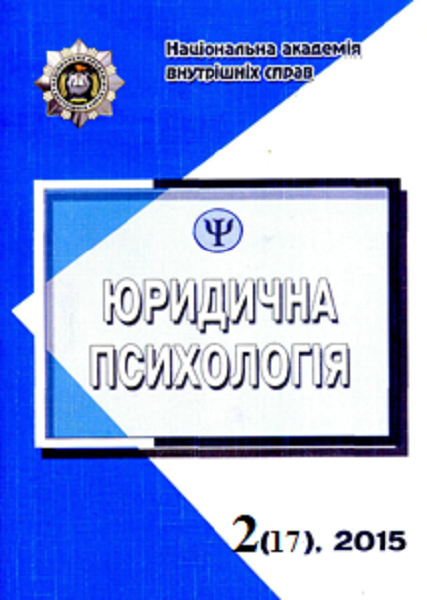Psychological Factors of Professional Communicative Competence of Staff Units Employees
Keywords:
professional activity, competence, communication, communicative competence, staff units personnel, professional psychological support
Abstract
In this article the definition of psychological factors contributing professional development of communicative competence in employees of staff units in the system of law enforcement agencies was examined. Not much credits need to be done in order to point out the fact that professional competence is the ability successfully operate on the basis of experience, skills and knowledge in order to reach professional goals. And professional communicative competence it is the ability of the person successfully installs and maintains professional communication within the professional duties and social status. The research in the theory and practice of juridical psychology shows that for effective operational and service activity it is required to master the scientific principles of communication and form ability to use it creatively. This fact is confirmed by the results of the survey. According to the workers of the staff divisions it needs to be systematicly improved in terms of professional abilities and personal qualities. The aforementioned factors require further elaboration, educational and methodological support in psychological training of staff units personnel. Employees of staff units actively provide: organization of work of strengthening discipline and legality in the activities of agencies and units of the Interior, the rights and legitimate interests of citizens, providing full and objective examination of circumstances of extraordinary events, the implementation of which is related to the competence of the service, prevention and provide consultations for authorities; optimal distribution and efficient use of existing staff size of the bodies of Internal Affairs to perform their assigned tasks and functions, to improve the structure and staffing of the Ministry of Internal Affairs based on the positive experience of bodies and divisions of Internal Affairs of Ukraine and law enforcement bodies of foreign countries on the use of forces and means in the fight against crime and the protection of public order; carrying out a qualitative selection of the personnel of bodies and subdivisions of Internal Affairs, universities, research institutions of the Ministry of Interior; organizing and conducting internal and physical training of personnel and initial training of persons accepted on service in bodies of Internal Affairs; organization of mass cultural and educational work in the bodies and divisions of Internal Affairs, social protection of employees of Internal Affairs agencies, veterans, retirees and their families. The decision of these professional tasks is carried out on the basis of communication with individual entities or groups, which makes communicative competence on the basic level.Downloads
Download data is not yet available.
Abstract views: 154 PDF Downloads: 287
Issue
Section
Psychological support of law enforcement
- Authors reserve the right to authorship of their own work and transfer to the magazine the right of the first publication of this work under the terms of the Creative Commons Attribution License, which allows other persons to freely distribute published work with mandatory reference to authors of the original work and the first publication of an article in this magazine.
- Authors have the right to enter into separate additional agreements on non-exclusive dissemination of the work in the form in which it was published in the journal (for example, to post an article in the institution's repository or to publish as part of a monograph), provided that the link to the first publication of the work in this journal is maintained.
- The journal's policy allows and encourages the posting of articles by authors on the Internet (for example, in electronic storehouses of institutions or on personal websites), both before the submission of this manuscript to the editorial office and during its editorial processing, as this contributes to the creation of a productive scientific discussion and positively affects the efficiency and dynamics of citing the published work.




